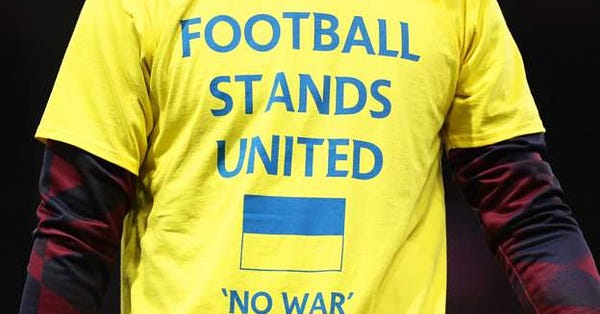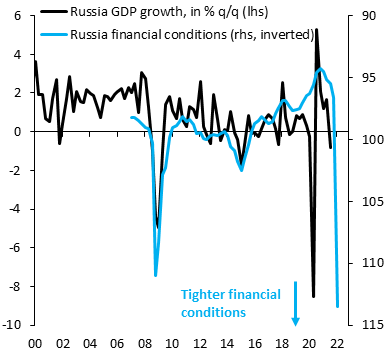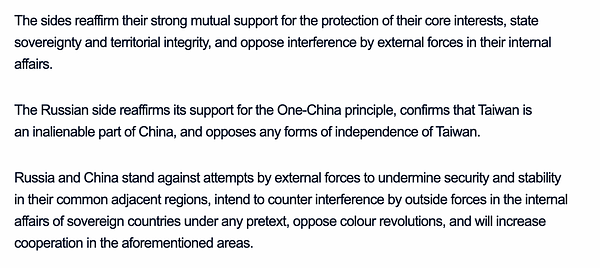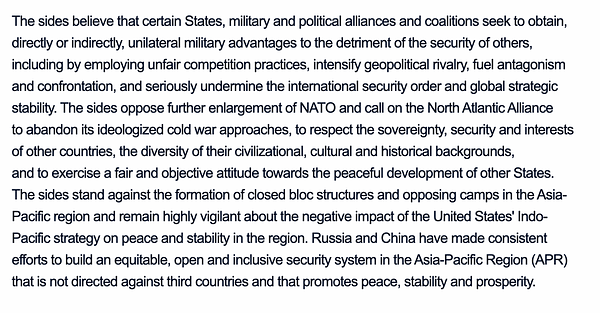There are more and more indications that Putin will employ violence against civilians in Ukraine. Russian officials may also be seeking to create pretexts around a Ukrainian chemical or even nuclear weapons program.
It would be nearly impossible for the Ukrainians to hide a chemical or nuclear weapons program - and they would be insane to try. Russian security services are embedded throughout the Ukrainian government, while a chemical or nuclear weapons program would prove enormously costly relative to Ukraine’s GDP. Any Kremlin claims about a potential Ukrainian nuclear weapons capability are almost certainly lies.
Of course, the Kremlin is likely advancing these claims in order to “justify” the use of extraordinary force, including against civilians. With the war appearing to go very badly for Russian forces, the Kremlin may be considering escalating attacks against urban centers Ukraine.
Assad and Putin’s military campaigns in Syria may have relevance for the next phases of the war in Ukraine. While Putin is extremely unlikely to employ strategic capabilities or even large-scale chemical weapons against Ukrainian cities, small-scale chemical weapons demonstrations against civilians targets cannot be ruled out. Most likely, however, is that Putin’s forces will continue to use conventional weapons against civilian populations, either incidentally or via purposeful targeting. Putin appears to be collecting data on how various actors (including, critically, Russian currently military forces engaged in Ukraine) will respond to atrocities against civilians.
The Chinese government is unlikely to criticize the Putin regime even if his forces commit widespread atrocities. If the war in Syria provides precedent, Beijing will say it condemns the use of violence against civilians but simply deny that Putin conducted any attacks against civilians. Just as the Chinese MFA says it supports sovereignty and territorial integrity but does nothing to stop the invasion of Ukraine, a sovereign nation, Beijing could very well say it opposes the use of violence against civilians even as Putin’s forces shell apartment complexes.
Finally, how might the war affect Sino-Russian military ties? While much will depend on the performance of the Russian military in the days ahead, there are reasons to believe that nearly everyone – including Xi and Putin – vastly overestimated the effectiveness of the Russian military. With Western anti-tank weapons initially proving to be highly effective against Russian tanks, the Russian military’s credibility is draining by the day.
It’s too soon to make any conclusions about the degree to which the Russian military’s problems can be ascribed to “software” deficiencies (morale, training, logistics planning and procurement, etc) vs “hardware” (inferior weapons systems, software integration etc). Still, the PLA and other Indo-Pacific militaries may be reassessing the capabilities of the Russian military and the value of their Russian military exports.
1) Ministry of Foreign Affairs
2) People’s Daily
3) How would the PRC respond to atrocities? Lessons from Syria
4) Chinese Domestic Public Opinion Management
5) Worth Your Time
1) Ministry of Foreign Affairs
Wang Yi Speaks with U.S. Secretary of State Antony Blinken on the Phone at Request – Chinese MFA
On March 5, 2022, State Councilor and Foreign Minister Wang Yi had a phone conversation with U.S. Secretary of State Antony Blinken at the latter's request.
Wang Yi said, at present, the top priority in China-U.S. relations is still to advance and implement the consensus reached by the two heads of state in their virtual meeting. China expresses grave concern over the U.S. side's recent words and deeds that run counter to the above-mentioned goal. Taiwan is an inalienable part of China's territory, and the Taiwan question is China's internal affair. The U.S. side should return to the true meaning of the one-China principle, stop encouraging and supporting "Taiwan independence" moves, stop interfering in China's internal affairs, and uphold the larger interests of China-U.S. relations with concrete actions.
The two sides exchanged views on the Ukraine issue.
Blinken briefed Wang Yi on the U.S. views and position on the current situation in Ukraine. Wang Yi said, the evolution of the situation in Ukraine up to now is not something China wants to see. The Ukraine issue is complicated, which not only concerns the basic norms governing international relations, but also is closely related to the security interests of various parties. Efforts should focus on not only solving the current crisis, but also maintaining long-term peace and stability in the region. As a permanent member of the UN Security Council, China always decides its position and policy based on the merits of the matter itself. China believes that the Ukraine crisis should be resolved in accordance with the purposes and principles of the UN Charter. First, respect and safeguard all countries' sovereignty and territorial integrity. Second, stay committed to peacefully solving disputes through dialogue. We hope that the war will stop as soon as possible, the situation on the ground will be eased, the life and property safety of civilians will be effectively guaranteed, and a large-scale humanitarian crisis will be prevented.
Wang Yi pointed out, the Ukraine crisis can only be solved through dialogue and negotiations. China supports every effort conducive to easing the situation and seeking political settlement. China opposes any moves that fan the flame, add fuel to the flame and escalate the tensions rather than promote a diplomatic solution. China will continue to speak out and do its best for peace. We encourage direct negotiations between Russia and Ukraine. [Comment: In other words, the PRC doesn’t seek to mediate talks between the two sides] Though talks may not go smoothly, the international community should continue to render collaboration and support until results and peace are achieved. We also encourage the United States, the North Atlantic Treaty Organization (NATO), and the European Union to engage in equal-footed dialogue with Russia, face up to the frictions and problems accumulated over the years, pay attention to the negative impact of NATO's continuous eastward expansion on Russia's security, and seek to build a balanced, effective and sustainable European security mechanism in accordance with the principle of indivisible security.
2) People’s Daily
Russia declares ceasefire in Ukraine for civilians evacuation -- defense ministry
Russian forces will observe a truce in Ukraine starting 10:00 a.m. Moscow time (0700 GMT) on Saturday to facilitate the evacuation of civilians via humanitarian corridors, the Russian Ministry of Defense said.
As was agreed by the Ukrainian side, the humanitarian corridors will allow the exit of civilians from Mariupol and Volnovakha in south Ukraine, the ministry said, without disclosing how long the ceasefire will last.
During their second round of peace talks on Thursday, Russian and Ukrainian negotiators agreed on the establishment of humanitarian corridors for the exit of civilians and on a temporary cessation of hostilities along the evacuation routes.
Comment: Russian forces appear to be targeting some of the evacuation corridors. I suspect the PD will not issue any corresponding updates, however.
NYT rumor proves nothing except the US does not learn from mistakes – People’s Daily
"China asked Russia to delay Ukraine war until after Olympics, US officials say."
Above is the headline that appeared in the New York Times on March 2, claiming that China had some knowledge about Russia's military plan. And the paper's source, as usual, is intelligence.
There is no need to waste a single minute on refuting so ridiculous a lie that's against common sense. The lie will never effectively demonize China as its fabricators expect. Instead it only proves one fact, namely, that the US is trying to weave an intelligence net all over the world and spy everybody.
It is the same intelligence net that misled a former US president into launching a war on Iraq for a bottle of washing powder in 2003. Seems the current team in the White House has not learned a bit from the wrong of its old predecessor.
It also proves where the US media outlets pay attention to. A total of 10 days after the conflict began, the New York Times was still busy fabricating rumors about China, instead of contributing a bit to how to end the crisis and bring peace back to Ukraine.
Actually everybody knows why the Ukraine crisis escalated into what it is today. It is the North Atlantic Treaty Organization's continued expansion eastward that added Russia's geographical pressure and worsened the Ukraine situation, behind which is the US aggressive policies. [Comment: No criticism for Putin]
As early as the 1990s, former US ambassador to Soviet Union George Kennan warned against that danger, but the US government turned a deaf ear to his voice. After the Ukraine crisis worsened this time, NYT columnist Thomas Friedman blamed the US' decision on Nato's eastward expansion for the failure, but the US government stayed deaf again.
Maybe US politicians need to learn from a traditional Chinese idiom, namely, that a dead knot can only be untied by the person who tied it. Just like Wang Wenbin, Foreign Ministry spokesman, said upon being asked about the NYT lie, it is time those who caused the Ukraine crisis thought again on the role they played in it, shoulder up their responsibility and take action, instead of pointing fingers at others.
China has set its economic growth target at around 5.5 percent in 2022 as the country's national lawmakers and political advisors gathered in Beijing to map out development priorities for this year.
The gross domestic product (GDP) target is one of the key goals laid out in a much-anticipated government work report delivered by Premier Li Keqiang to the national legislature, which began its annual session on Saturday.
…
At a time when the world economy is still facing mounting pressure due to the pandemic and other uncertainties including geopolitical tensions [bolded by The Report], a growth target of around 5.5 percent for the world's second-largest economy is expected to significantly boost the global economic recovery, analysts said.
…
With the 5.5-percent growth target, China will continue to drive global economic growth in 2022, Zhang Yuyan, an economist at the Chinese Academy of Social Sciences and a national political advisor, told Xinhua, adding that the country is fully capable of making economic progress while maintaining stability.
Previously, major global organizations downgraded their world growth forecasts for 2022, citing pandemic shocks and rising inflation, among other factors.
In late January, the International Monetary Fund projected the global economy to grow by 4.4 percent in 2022, down by 0.5 percentage points from its October forecast, as many economies are grappling with supply disruptions, higher inflation, record debt and persistent uncertainty. [bolded by The Report]
In the report, [Li Keqiang] also said that pressures and challenges remain ahead due to increasing external uncertainties.
In 2022, the Chinese economy is facing the triple pressures of shrinking demand, disrupted supply and weakening expectations, he said. This was in line with the judgement made at the Central Economic Work Conference in December 2021.
Comment: There is no direct mention of how Putin’s invasion of Ukraine will affect markets. A sign that Beijing is willing, at least for now, to shoulder the economic costs of the invasion.
3) How would the PRC respond to atrocities? Lessons from Syria
China's Position on Syria Issue – PRC MFA (PRC Embassy in the Republic of Botswana, date unknown)
Continued conflict in Syria has brought sufferings to the Syrian people and impacted peace and stability in the Middle East. China is deeply worried about the situation. China maintains that political settlement is the only realistic way out of the Syrian crisis. All relevant parties in Syria should take credible steps to implement the spirit of the communiqué of the foreign ministers' meeting of the Action Group on Syria, cease fire and stop violence immediately, positively respond to the initiative of holding the second Geneva conference on the Syrian issue, and start and implement a Syrian-led, inclusive political transition as soon as possible. Relevant parties in the international community should provide positive and constructive help for the political settlement of the Syrian issue and avoid taking any action that could further militarize the crisis.
China follows the latest developments in Syria closely. We firmly oppose the use of chemical weapons by anyone. [Bolded by The Report] China supports the UN investigation team in conducting independent, objective, impartial and professional investigations. The next step should be determined by the Security Council based on the findings of the UN investigation team. Unilateral military actions that bypass the Security Council will have serious impact on the situation in Syria and the Middle East region and they are also a violation of international law and the basic norms governing international relations.
China has maintained an objective and just position and a responsible attitude on the Syrian issue. We are committed to protecting the fundamental interests of the Syrian people, maintaining peace and stability in the Middle East region and upholding the purposes and principles of the Charter of the United Nations and basic norms governing international relations. China has made consistent efforts to promote peace and encourage dialogue, firmly supported and actively promoted the political settlement of the Syrian issue, and supported Mr. Brahimi, UN-Arab League Joint Special Representative for Syria, in making impartial mediation. China will respect and support any settlement plan on the Syrian issue as long as it is widely accepted by all relevant parties in Syria. China has watched closely the humanitarian situation in Syria. We have provided humanitarian assistance to the Syrian people, including Syrian refugees in other countries, as our ability permits, and will continue to do so.
Comment: The PRC squared the circle of opposing the use of chemical weapons and supporting Assad by denying that the dictator had ever employed that weapon.
Evolving Sino-Russian Cooperation in Syria - Yixiang Xu for United States Institute of Peace (2017)
Among nonregional actors, Russia and China have been the most significant supporters of the Bashar al-Assad regime and have jointly cast a string of vetoes in the UN Security Council, rejecting sanctions on Syria over alleged use of chemical weapons by the Assad government and efforts to oust him from power.
Russia/Syria: War Crimes in Month of Bombing Aleppo – Human Rights Watch (November 2016)
The Violations Documentation Center, a Syrian civil monitoring organization, documented that the bombing campaign killed more than 440 civilians, including more than 90 children. Airstrikes often appeared to be recklessly indiscriminate, deliberately targeted at least one medical facility, and included the use of indiscriminate weapons such as cluster munitions and incendiary weapons. Satellite imagery that Human Rights Watch analyzed shows more than 950 new distinct impact sites consistent with the detonation of large high explosive bombs across the area during the month.
Comment: Chemical weapons played an important role in Assad’s/Putin’s war against the Syrian people, but the majority of casualties were caused by conventional munitions.
There have been few official responses by Chinese authorities to Russia’s intervention in Syria. Reactions have mainly been expressed by China’s foreign ministry officials. The Chinese media, for their part, have tended to merely offer neutral agency-style information, and to a large extent to base their reports on Russian sources.
Comment: Seems remarkably familiar to China’s reaction to the invasion of Ukraine, doesn’t it?
4) Chinese Domestic Public Opinion Management
How China Embraces Russian Propaganda and Its Version of the War – NYT
In much of the world, Russia is losing the information war over Ukraine. In China, though, it’s winning big….
If China wants to remain officially ambiguous about whether it supports Vladimir V. Putin’s war — refusing to call it an invasion and abstaining from a U.N. vote to condemn the invasion — its state-controlled media nonetheless makes very clear where China stands.
Comment: Very comprehensive survey of Chinese public opinion vis-à-vis Ukraine.
'How can I survive': stranded Chinese run gauntlet in Ukraine – Yahoo
Cao never imagined his holiday in eastern Europe would involve hunkering down in a bomb shelter as Russian shells thudded outside near the devastated Ukrainian city of Chernihiv.
Comment: Serious question: are Western media outlets covering this story more than Chinese ones?



5) Worth Your Time
In the long run, the United States can’t contain both Russia and China. Europe’s resolute opposition to Putin’s war provides an opening for a strategic shift.
Is the Russian Air Force Actually Incapable of Complex Air Operations? – Justin Bronk for RUSI
While the early VKS [Russian Aerospace Forces] failure to establish air superiority could be explained by lack of early warning, coordination capacity and sufficient planning time, the continued pattern of activity suggests a more significant conclusion: that the VKS lacks the institutional capacity to plan, brief and fly complex air operations at scale. There is significant circumstantial evidence to support this, admittedly tentative, explanation….
Aside from prestige events such as Victory Day parade flypasts, the VKS also conducts the vast majority of its training flights in singles or pairs. This means that its operational commanders have very little practical experience of how to plan, brief and coordinate complex air operations involving tens or hundreds of assets in a high-threat air environment.
Comment: While the Russian military’s performance in Ukraine is admittedly an imperfect proxy for the way it would fight a hypothetical conflict with NATO, there is more and more evidence that Russian forces are suffering from profound institutional decay. Russian *conventional* forces may pose less risk to NATO than previously believed, and the West should be careful to avoid setting off further security dilemmas, particularly those involving strategic weapons. Reinforcement of NATO’s eastern flank must occur rapidly but NATO should do it thoughtfully and responsibly.
Taiwan detects 39 Chinese warplanes, scrambles jets – DW
Taiwan reported on Sunday that 39 Chinese warplanes, including a bomber, were detected in the south-western Air Defense Identification Zone (ADIZ). The island's ADIZ is not the same as territorial airspace but instead is self-declared airspace that is monitored for national security purposes.
Comment: It’s noteworthy that the PLAAF is conducting training complex training flights/military diplomacy maneuvers with dozens of planes, instead of in singles and pairs. A couple of tentative conclusions, although I’m not a military expert by any means: the PLAAF is probably more capable than the VKS, and potentially *much* more capable. Furthermore, why is the PLAAF conducting more complex training operations than the VKS? The simplest and most likely explanation is that the PRC armed forces are much better resourced. Still, one also wonders if PRC security services uncovered deficiencies in the VKS prior to the invasion.




Kadyrov’s Ukrainian Maskirovka – Harold Chambers for Jamestown
The names of the kadyrovtsy leaders killed or captured on February 26 have not been released by the Ukrainian government. And notably, the aforementioned videos of the leaders posted by Kadyrov to “prove” they were still alive have had their metadata altered to hide the date and time of recording. Indeed, the idea of a Chechen leadership deficit in the theater is further supported by the sudden deployment to Ukraine of Zamid Chalaev, the top commander of the Akhmat Kadyrov Regiment, and other personnel from the unit.
Anthony Saich on how China sees the Russian invasion of Ukraine – SupChina
But I think most people are coming to the conclusion that the actions have really created an extraordinary dilemma for Xi Jinping and the leadership in Beijing. Around the time of the Olympics, everything was hunky-dory, you know, there was their new best friend Vladimir Putin and their relationship was going to have no limits. And then of course he went back home and proceeded to invade Ukraine in a brutal fashion.
Now, did Xi Jinping know? Well, we are never going to know the answer to that [with certainty]. I think some signs show that certainly the Foreign Ministry was out of the loop, but given the lack of transparency in the Chinese system, the suspicion is always going to remain that he knew more than has been revealed publicly.


Ukraine says China is ready to act as a peacemaker – FT
Kyiv believes Beijing wants to stop the war with Russia but critics warn of a ‘smokescreen’
Comment: The article and thread (below) are worth your time




v/r,
Joe Webster
The China-Russia Report is an independent, nonpartisan newsletter covering political, economic, and security affairs within and between China and Russia. All articles, comments, op-eds, etc represent only the personal opinion of the author(s) and do not necessarily represent the position(s) of The China-Russia Report.


